We aspire to lead biofuel manufacturing in Spain and Portugal. To that end, by 2030 we aim to have an annual production capacity of 2.5 million tons of biofuel, of which 800,000 tons will be sustainable aviation fuel (SAF), enough to fly over the planet 2,000 times.
What steps have we taken so far?
Biofuel production
In 2022, we will start producing 2G biofuels at our "La Rábida" Energy Park in Palos de la Frontera in Huelva by converting some of our production facilities.
In April 2023, we announced the construction, together with Bio-Oils, of the largest 2G biofuel plant in Southern Europe at the La Rábida Energy Park. In February 2024, we began its construction, and its start-up in 2026 will allow us to double the current production capacity of second-generation biofuels for Cepsa and Bio-Oils, reaching one million tons. A project supported by the European Investment Bank (EIB), with whom we signed a €285 million loan in June 2024 to fund the construction of said plant.
We have also begun research and development for projects to build and operate plants for biomethane production using agricultural and livestock waste. By 2030, we are aiming to manage a project portfolio of 4 TWh per year, equivalent to enough energy for 650,000 homes. In July 2024, we announced our strategic partnership with PreZero, which will allow both companies to advance in our decarbonization objectives.The objective is to boost the biomethane market through collaborating in the supply of this renewable gas by PreZero Spain, as well as the joint development of biomethane plants.
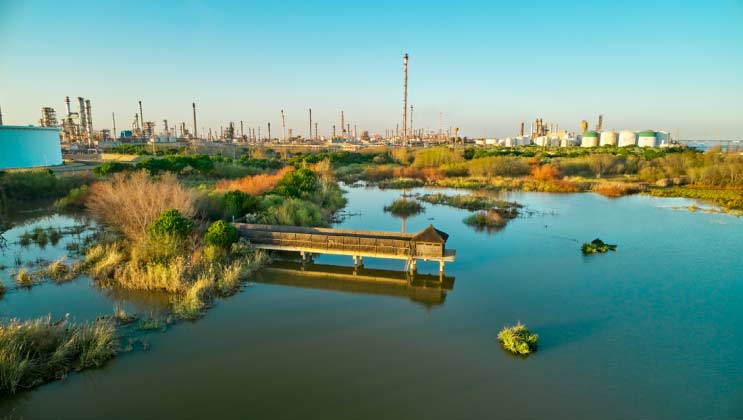
La Rábida Energy Park (Huelva)
Discover the main data in this infographic of the new plant.
Air transport
We are one of the main producers and suppliers of aviation fuels in the Spanish market and we want to be at the forefront of the decarbonization of the aviation sector. To date, we have signed partnerships with leading airlines such as Iberia, Iberia Express, Air Nostrum, Vueling, Binter, Etihad, TUI, Wizz Air, and Volotea to promote the use of SAF.
At the end of 2022 we conducted a pioneering test in Seville and more than 200 flights departed from the airport with SAF produced by Cepsa. We supply enough SAF to cover 400,000 kilometers, the equivalent of ten times around the world. This was the first time that SAF was used at an airport in southern Europe.
Last July we became the first company to the first company to offer SAF in four of the main Spanish airports: Madrid, Barcelona, Palma de Mallorca, and Seville. And in October, we extended the sale of this biofuel to the Malaga airport. Together, these five locations account for around 60% of the country's passenger traffic.
We have partnered with Air Europa to supply SAF for one year to cover the first monthly Madrid-Havana flight. This is the first time that two companies in Spain have established a regular supply of this sustainable fuel for a specific air route.
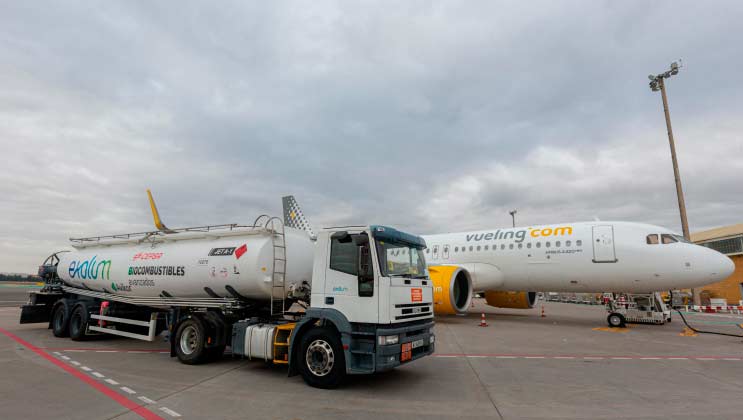
SAF supply truck
Sea transport
At Cepsa we are leaders in Spain in the supply of energy to maritime transport and aim to continue to hold that position in the supply of sustainable fuels. We can deliver biofuel by barge in the area of the Strait of Gibraltar and in Barcelona and also by tanker at the more than 60 ports where we operate.
At the end of 2022 we successfully carried out the first test in Spain of 2G biofuels on one of the ships we use for ship supply. In doing so, we test the efficacy of these fuels before selling them to our customers.
In August 2023, Naviera Armas Trasmediterránea ferries will make 84 trips across the Strait of Gibraltar using second-generation biofuels produced at our San Roque Energy park. It was the first time that passenger ships used this type of sustainable fuels in Spain.
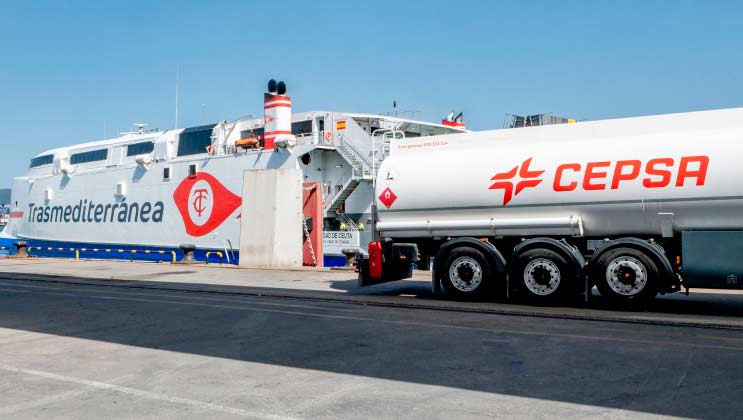
Biofuel-powered passenger ship
Ground transport
In November 2023, we began marketing 100% renewable diesel (HVO) both at our service stations and directly at our professional customers' facilities. The objective is to provide them with an immediate solution to promote the decarbonization of road transport.
Also in 2023, we have successfully completed in rail transport, this year, together with Maersk and Renfe, the first test in Spain with 2G biofuels in the rail sector. More than 100 trips have been made between Algeciras and Cordoba, a section of the corridor between Algeciras and Madrid that is not electrified, with renewable diesel (HVO) produced at our La Rábida Energy Park.
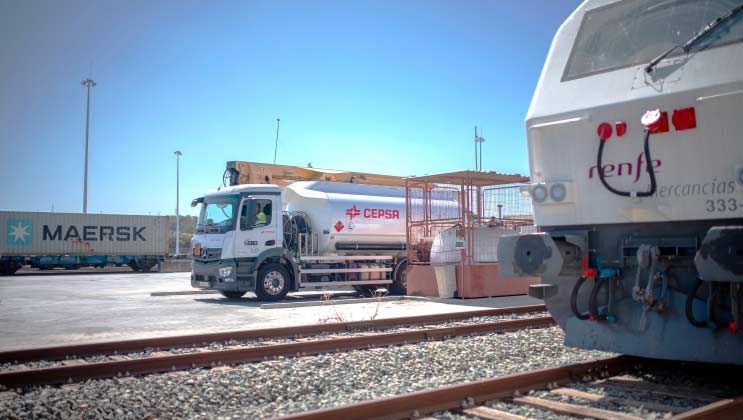
Supply of biofuels in rail transport
Feedstock research
Access to feedstock is one of the industry's greatest challenges in 2G biofuel production. That is why we use different suppliers and are committed to researching different feedstocks to complement our sources of supply for the production of this type of biofuels.
In April, we reached a global, long-term agreement with Apical to secure the majority of the feedstock supply for the new 2G biofuels plant we are going to build in Huelva.
We have also signed several agreements that will allow us to promote greater strategic self-sufficiency for Spain in terms of energy supply and independence, while also fostering new economic and development opportunities for rural areas:
- Agreement with the Spanish National Research Council (CSIC) to research the feasibility of planting energy cover crops in different rural areas of Spain.
- Together with Cooperativas Agro-alimentarias de España we are working to drive the production of 2G biofuels from waste generated by the Spanish agricultural and livestock sectors.
- In collaboration with the Canary Islands Institute of Technology (ITC), we will promote the development of biofuels from microalgae.
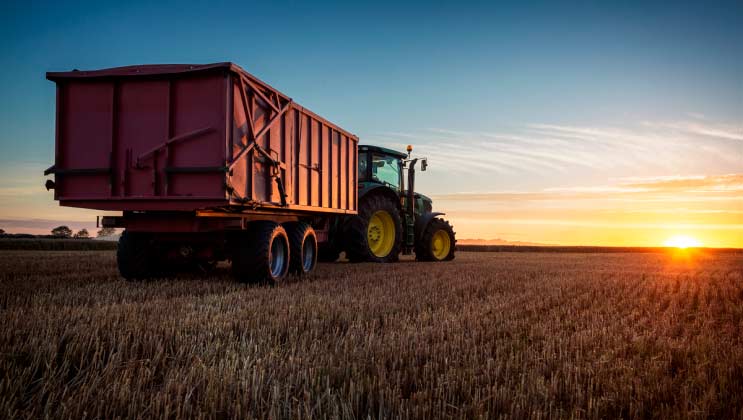
Together with other renewable fuels, 2G biofuels have a central role to play in meeting the targets set out in the Fit for 55 package, a set of legislative proposals that will help the European Union reduce its net greenhouse gas emissions by 55% by 2030 (compared to 1990) and achieve climate neutrality by 2050.
The development and use of biofuels also contributes to several of the 2030 Agenda’s Sustainable Development Goals: SDG 7 (Affordable and clean energy), SDG 8 (Decent work and economic growth), SDG 12 (Responsible consumption and production), and SDG 13 (Climate action).


Our goal is to lead 2G biofuel production in Spain and Portugal. By 2030, we will have an annual production capacity of 2.5 million tons, 800,000 t of which will be SAF.
Find out more
